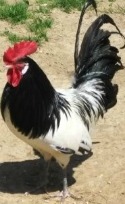Lakenvelder: The Handsome German Bird
The Lakenvelder is a chicken breed that originates in Germany. It has an ornamental quality and and is good layer of small white eggs.
Lakenvelder Facts:
Class: Standard: Continental / Bantam: single Combed, Clean Legged
Size: Standard Male: 5 Ibs. / Standard Female: 4 Ibs. / Bantam Male: 24 oz. / Bantam Female: 20 oz.
Comb, Wattles & Earlobes: They have a single comb with five distinct points held upright and medium length well-rounded wattles with small oblong earlobes. The comb and wattles are bright red and the earlobes are white.
Color: The beak is dark horn and the eyes are dark red. The shanks and toes are slate. Male: They have a rich black plumage on the head, neck, saddle, and tail. This distinctly stands out against their bright white body. Female: They have black on the head, neck, and tail and a white body.
Place of Origin: Germany
Conservation Status: Threatened
Special Qualities: A very handsome bird who is a good egg layer.
A very ornamental and beautiful bird, the breed looks good with its offset black and white color. The breed was developed in the early nineteenth century near the border of Germany and Holland.
The only recognized coloring in the United States is the black and white variety, but some hatcheries sell a golden variety. Outside the U.S. a blue variety also exists, but has not made it stateside yet. In Europe, the breed is commonly known as the Vorwerk.
These birds are quite active and if allowed to free range and will move around in a fairly large area. They tend to be a little flighty and the hens lay small white eggs and do not go broody.
These birds were first recognized by the APA in 1939.

Custom Search




New! Comments
Have your say about what you just read! Leave me a comment in the box below.